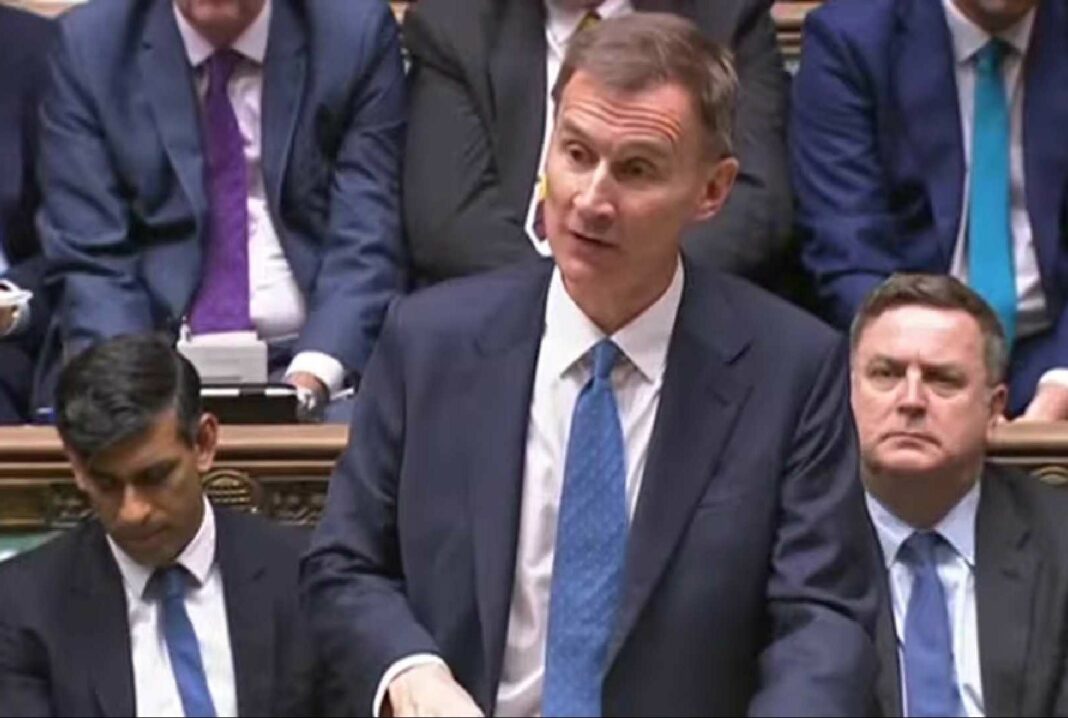25 NOVEMBER 2023 | NEWS IN BRIEF
The weekly Westminster digest. Covering the biggest stories in British politics.
In this inaugural edition of News In Brief by William Hallowell, it’s been a busy week in Westminster. From the Chancellor’s Autumn Statement to record-breaking immigration figures, here are this week’s biggest stories.
National insurance to be cut as minimum wages rise
Probably one of the biggest takeaways from Chancellor Jeremy Hunt’s Autumn Statement is that the Government will cut national insurance contributions from 12 percent to 10 percent, effective from 6 January. He says this will save £450 for people on the average salary of £35,000.
Contributions will be reduced for the self-employed as the Government has abolished the class 2 flat-rate weekly contributions of £3.45 a week, currently paid if earnings for the year are above £12,570, and is reducing class 4 contributions on all earnings between £12,570 and £50,270 from a rate of 9 per cent to 8 per cent.
The move will likely please the Tory Right amid criticisms that Rishi Sunak is not ‘conservative’ enough. The Government has been under increasing pressure to tackle the rising cost of living, and cutting national insurance is certainly something Conservative MPs will shout about.
But critics have been quick to make a point that this is just a headline-grabber. In 2022, Boris Johnson broke his manifesto promise not raise national insurance after hiking it by 1.25 percentage points to fund his plan to fix social care, so it should come as no surprise that Government critics have slammed this as reversing the damage. They have also accused the Tories of attempting to use the Autumn Statement to win back votes ahead of the next General Election.
The Government has also raised the National Living Wage. For over-23s, wages will rise from a minimum of £10.42 to £11.44 an hour, and 21 and 22-year-olds will be eligible for the National Living Wage. This will come into place from April 2024.
The National Minimum Wage for 18 to 20-year-olds will also rise from £7.49 to £8.60 an hour. Although raising wages may prove to be a plan to appease young people, a group of Labour MPs have campaigned for some time for a £15-an-hour minimum wage for workers, which they say is affordable.
In spite of what taxpayers may see as positive, Sir Keir Starmer accused the Conservatives of trying to “spin” the Autumn Statement whilst “living standards are dropping, the tax burden is going up and disposable income at the end of this Government is going to be less than it was at the beginning for ordinary working people”.
Controversial welfare plans
Also to come out of the Chancellor’s statement is the 6.7 percent rise in benefits, which will take effect from this coming April too. According to the Joseph Rowntree Foundation, this means a family with two children on standard allowances should receive about £900 more in the year compared to the previous 12 months.
This will coincide with the Government’s plan to incentivise the unemployed into work. The Conservatives will introduce a policy next year detailing that anyone who fails to find work for more than 18 months will have to undertake work experience placements.
Additonally, claimants who refuse work or to engage with job centre staff would need to reapply for benefits, and will therefore lose access to them for a period of time. Labour MP Nadia Whittome said these welfare reforms were “not about supporting employment, but waging war on disabled people” and that “threatening people with destitution won’t help anyone”.
LBC reported earlier this week that the Prime Minister plans to launch a ‘work-from-home’ drive in an attempt to encourage welfare claimants who are disabled or have mobility or mental health issues into work.
This means an estimated 370,000 people with disabilities and chronic health conditions will be ineligible for incapacity benefits worth an extra £5,000 a year and forced to look for work, which was slammed by Sarah Hughes, Chief Executive of mental health charity Mind, who said the reforms were predicated on “baseless assumptions about disabled people”.
Net immigration up 745,000 in last 12 months
One of the biggest headlines to hit the press this week was that the Office for National Statistics (ONS) published its latest immigration figures. In the year to December 2022, net migration shot the UK’s population up by a record 745,000.
It comes as the Conservatives are facing mounting pressure to tackle the refugee crisis too, which several right-wing commentators predict will come to shape the outcome of the next election. This circles back to criticisms of the Prime Minister that he is not as right-wing as the rest of the Tory party. This could certainly threaten his leadership in time to come, given how ruthlessly backbenchers overthrew Liz Truss’ short premiership.
Voters who want to see migrant numbers coming down will be looking to Sunak for a solution. The Government has already said it will look to change to the law, after the Supreme Court ruled that Johnson’s Rwanda scheme was unlawful. But this only goes so far to tackle illegal immigration, given that the majority that make up the 745,000 figure came to the UK legally.
Suella Braverman, who after being sacked as Home Secretary lashed out at the Prime Minister for failing to tackle immigration, said the news was “a slap in the face to the British public” – which should cause alarm bells to ring for Sunak. Already earmarked by some to be a future Conservative Party leader, Braverman holds sway with the Tory Right, and it would be remiss not to anticipate that she is bolstering backbench support.


























